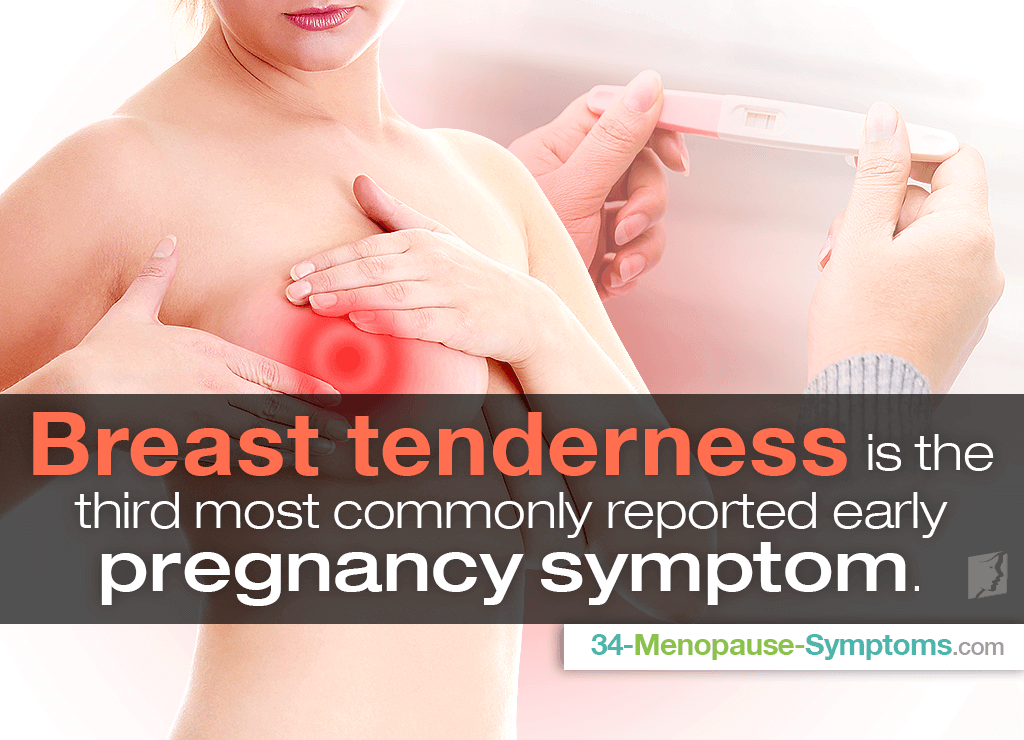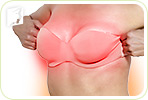Breast tenderness can be a symptom of a host of conditions, including premenstrual syndrome (PMS) and menopause. Typically, however, it is experienced as an early sign of pregnancy.
In order to manage pregnancy-triggered breast tenderness and its symptoms, read on.
How Are Breast Tenderness and Pregnancy Related?
For many women, breast pain is a symptom of pregnancy. It can often occur before other pregnancy symptoms and can start as early as one to two weeks after conception.
It is the third most commonly reported early pregnancy symptom after missed periods and nausea. However, because breast tenderness can also be experienced during a menstrual cycle as part of PMS, this women may not initially associate this symptom with pregnancy.
Why Do I Experience Breast Tenderness during Pregnancy?
Breast tenderness during pregnancy is triggered by the sudden influx of hormones - such as estrogen and progesterone - that are getting your breasts ready for future lactation. There is also increased blood supply to your breasts.
Keep in mind that as the milk ducts start to grow as the pregnancy progresses, the breasts themselves will start to swell and become more sensitive, especially the nipples. This may be discomforting, but in most cases, it is bearable.
Extreme breast tenderness during pregnancy should be evaluated by a doctor to rule out other possible causes.
What Other Symptoms Will Accompany My Breast Tenderness during Pregnancy?
Common Breast Changes during Pregnancy
- Veins become highly visible
- Breast can increase in size by up to two cup sizes
- Tingling, throbbing, or burning sensation
- Increased nipple sensitivity
- Itchiness
- Heaviness
- Oversensitivity
In the case of breast tenderness during early pregnancy, the ache can also be accompanied by other symptoms of early pregnancy, such as:
- Missed period. This is perhaps the most obvious and - consequently - most reported early pregnancy symptom. Nevertheless, some women might find themselves simply experiencing a significantly lighter period than normal.
- Nausea. Commonly referred to as morning sickness, nausea is the second most commonly reported pregnancy symptom that mainly occurs during the first trimester. It happens because of the drastic hormonal fluctuations initially taking place in a woman's body. Nausea can make it difficult to consume or keep anything down, and it can actually be experienced any time of the day.
- Fatigue. As fatigue and exhaustion are often common side effects of pregnancy, consider the possibility that you might be pregnant if you're finding yourself in frequent need of naps. This early pregnancy symptom can occur as early as the first week after conception.
Other common symptoms of pregnancy include mood swings, constipation, headaches, frequent urination, backaches, sensitivity to smell, weight changes, gas, and more.
How Can I Treat Breast Tenderness during Pregnancy?
When pursuing treatment for breast tenderness during pregnancy, be sure that the specific treatment option is safe. Use of medications and supplements could negatively affect the health of the fetus because certain medications can cross the placenta and hurt the baby. So, treatment is limited.
Therefore, it would be best to take natural measures that help reduce or lessen the pain.
Simple lifestyle changes can be enacted by establishing a stable, moderate exercise regimen (at least 30 minutes a day, five days a week) and consuming a balanced diet free of inflammation-promoting triggers, such as processed goods, added sugars, fried foods, and more.
Also, tips for managing breast tenderness during pregnancy include:
- Avoid under wired bras
- Wear a good supportive bra for exercise
- Soak in a warm bath
- Apply a cool cloth to inflamed areas
Key Takeaways
In conclusion, breast tenderness is a common symptom of early pregnancy. It is caused by drastic hormonal fluctuations as well as swelling provoked by growth of the milk ducts in preparation to feed another human being growing in the womb. Also, breast tenderness in early pregnancy is commonly accompanied by symptoms of missed periods, nausea, fatigue, mood swings, constipation, and more. Even though treatment options are limited, there are a variety of ways to reduce or lessen the discomfort, thus making your path to motherhood easier.
Sources
- American Pregnancy Association. (2018). Pregnancy Symptoms - Early Signs of Pregnancy | Breast Changes During Pregnancy. Retrieved October 5, 2018, from http://americanpregnancy.org/getting-pregnant/early-pregnancy-symptoms/ | http://americanpregnancy.org/pregnancy-health/breast-changes-during-pregnancy/




